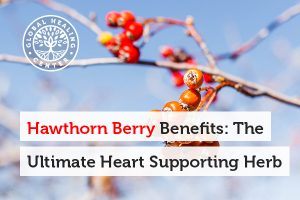
In the United States, someone is affected by cardiovascular disease every 42 seconds.[1] If you or a loved one are experiencing heart-related health problems, then you should be aware of natural herbs that support heart health. Among these beneficial herbs, hawthorn berry is the most used and effective. For centuries, it has been cherished for its culinary and therapeutic value.[2] While its popularity has waned in the United States, the herb is popular across Europe as a way to promote normal heart health. Research confirms the heart-related benefits of hawthorn berry include reduced chest pain, normal blood pressure, normal cholesterol levels, and healthy arteries.
| Hawthorn Berry Quick Facts | |
|---|---|
| Common Species | Crataegus laevigata, Crataegus monogyna, Crataegus oxyacantha |
| Other Names | English Hawthorn, Haw, Hawthorn Tops, Mayhaw, and Whitethorn Herb |
| Family | Rosaceae |
| Origin | Temperate climates in Europe, Asia, and North America |
| Health Benefits | Heart Health, Digestive Support, and Skin Protection |
| Common Uses | Herbal Medicine, Candies, Preserves, and Landscaping |
How Hawthorn Berry Works
The main parts of the hawthorn tree—the berries, leaves, seeds, and flowers—have therapeutic value. Each is packed with beneficial flavonoids, oligomeric proanthocyanidins (OPCs), saponins, phenolic acids, and other phytonutrients that encourage good health and stimulate internal healing mechanisms.
Promotes a Healthy Heart
The flavonoids and OPCs in hawthorn berry are specialized nutrition to support a healthy heart. They are potent antioxidant agents that help reduce free radicals, promote circulation, and support normal health of the arteries.[3] These heart-related benefits are the main reason hawthorn has such a long history of use.
Heart failure, which exists in two forms—diastolic and systolic—routinely results in injury or death. Diastolic is when the heart can’t fill with blood correctly; systolic is when the heart can’t pump blood efficiently. In a study involving over 800 patients with chronic heart failure, hawthorn berry provided significant benefit.[4]
Supports Normal Blood Pressure
Twenty-nine percent of adults in the United States suffer from high blood pressure, and all signs suggest that number will continue to grow.[5] High blood pressure can damage blood vessels and, left unchecked, it may even lead to heart attack or stroke. Several studies have found that hawthorn may promote balanced blood pressure.[6]
Encourages Balanced Cholesterol
There is good cholesterol (HDL) and bad cholesterol (LDL). The accumulation of bad cholesterol can lead to serious health complications. High cholesterol may double your risk of heart disease.[7] Studies suggest that hawthorn berry supports normal cholesterol levels. One animal study found that extracts of the plant given to rabbits with high cholesterol helped reduce cholesterol levels.[8] In another study involving mice, hawthorn berry reduced LDL levels.[9]
Antioxidant Activity of Hawthorn
This herb’s primary antioxidant activity comes from two compounds—flavonoids and OPCs. They help support a healthy heart, and they can support your health in other ways, too.[10] Antioxidants protect against free radicals. Unchecked, free radicals damage cells, cause aging, and negatively affect well-being.
Other Benefits of Hawthorn Berry
Hawthorn berry does more than support heart health. It has a long history of use in folk medicine and Ayurveda to support overall health in many capacities, including digestive health and skin health. In one study, hawthorn berry demonstrated gastro-protective benefits in mice.[11] In another study, hawthorn supported the development of healthy skin cells.[12]
Hawthorn Berry Side Effects and Precautions
Aside from a few caveats, hawthorn berry is generally safe to consume. In most studies, few if any side effects were reported. However, possible side effects include headache, nausea, and irregular heartbeat.[13] As a general precaution, women who are pregnant or nursing and children should not take hawthorn berry. Additionally, if you take any form of medication or have any heart concerns, consult your trusted health care practitioner before taking hawthorn berry.
Available Forms of Hawthorn
As a plant-based nutrition source to support good health, hawthorn extract provides the best value. It’s available as a powder, capsule, or liquid. Hawthorn berry usually refers to the herbal extract as a product of the whole plant, not just the berries. Some researchers exclusively use the plant’s flowers and leaves because of their higher flavonoid concentration.
Beyond its therapeutic value, hawthorn berries are enjoyed around the world in the form of candies, jams, jellies, and even wine. The tender, spring leaves are edible and make a wonderful salad garnish. Berry size, color, and name vary from region to region. Small, tart, red berries called mayhaw are found in the United States. Native to many southeastern states, mayhaw has a rich tradition of culinary use. Mayhaw jelly is considered a delicacy, and the syrup from the berries is a component in many sauces, pie fillings, and desserts. While the plant was once easy to find and harvest in the wild, it’s quickly disappearing due to deforestation and disease.
Natural Ways to Promote a Healthy Heart
While hawthorn berry provides specialized nutrition for supporting a healthy heart, healthy lifestyle choices are also important. Eating heart-healthy food, regular exercise, and managing stress are all effective, long-term strategies for promoting a healthy heart.
Have you used hawthorn berry to support your heart health? Have you tried any jam, jelly, syrup, or other product that contains hawthorn berries? Tell us about your experiences in the comment section below.
The post Hawthorn Berry Benefits: The Ultimate Heart Supporting Herb appeared first on Dr. Group's Healthy Living Articles.
source http://www.globalhealingcenter.com/natural-health/hawthorn-berry-benefits/
No comments:
Post a Comment